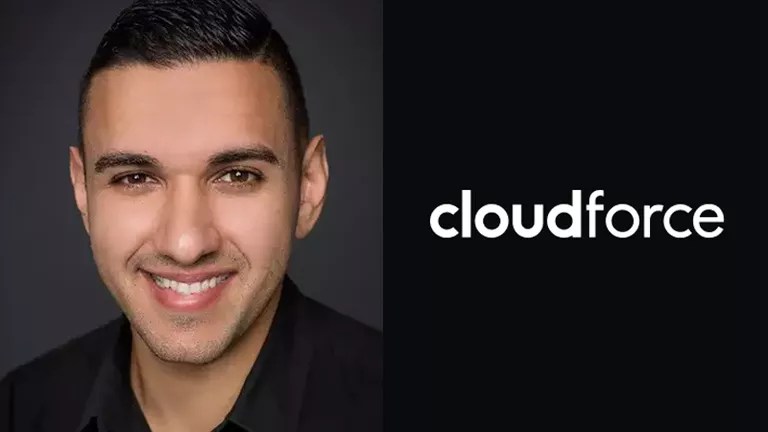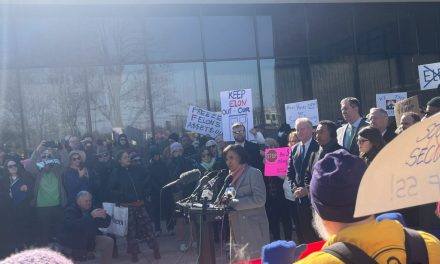
of his own Microsoft Gold Partner firm, Cloudforce. (Courtesy photo)
By Husein Sharaf
Maryland has long been a center of invention. That’s one reason I located Cloudforce, my own rapidly growing cloud consulting company, in the National Harbor area. I knew that here I would find the talent, creativity, and business opportunities needed for Cloudforce to thrive.
Since that time, I’ve learned that a flourishing tech sector doesn’t happen by accident. While smart people executing big ideas are an essential ingredient, they’re not enough on their own. No, as boring as it may sound, ongoing discovery and innovation also relies on government policy – particularly as it pertains to patents and trademarks.
Patents, which are enshrined in the Constitution, balance two worthwhile goals: We want to motivate people to invent new, useful things, and we want those things to become widely available.
A further benefit of patents is that they can be licensed out, giving other companies the right to use, build on, or develop a product – and driving more innovation and economic value. We know the value of this benefit first-hand, as we routinely license the intellectual property of other incredible tech firms like Microsoft to deliver our own unique products and services to some of the biggest global brands and to our great nation’s most historic institutions.
Patents have played a central role in my business and life. I founded Cloudforce in 2010 with the intention of leveraging the power of the Microsoft cloud to build awesome things and make lives better. From the start, we’ve prioritized a human-centered approach that puts people at the center of every solution we deliver and ensures every service we provide is accessible for businesses, non-tech staff and entrepreneurs alike.
Over the past 13 years, we’ve created and implemented custom cloud-computing tools for our clients, which include government agencies such as NASA, as well as businesses such as Washingtonian Magazine. Many of the services we offer are built on Microsoft’s cloud services platform, Azure. Like other computing systems, Azure wouldn’t exist without patents. They reward Microsoft as the inventor and provide the legal framework that allows hundreds of thousands of client and partner organizations to use Azure.
Patents are also central to our state economy. CNBC recently ranked Maryland seventh in the nation for technology and innovation, while a study by WalletHub named us the fourth most innovative.
Unfortunately, that patent system is in danger due to policy shifts. Over the last 13 years, a series of Supreme Court decisions found that key cutting-edge technologies aren’t patent-eligible, muddying the waters for researchers in fields like diagnostic medicine, AI, telecommunications and genetics. At the same time, monopolistic firms have adopted a strategy of stealing inventions from smaller competitors and then bullying them out of business via the legal system.
Fortunately, there are legislative fixes in the works. One is the Patent Eligibility Restoration Act, which clarifies which innovations in a range of high-tech sectors are patent-eligible, and another is the PREVAIL Act, which would reform the legal process for challenging and defending patents, making it possible for small businesses to protect their creations from being stolen by companies with more money and bigger legal teams.
Right now, our innovation sector, in Maryland and across the nation, is hindered both by flawed patent policy and by the absence of adequate protection for brand identity and integrity. Unfortunately, a loophole exists that jeopardizes name recognition by allowing companies, whether knowingly or not, to register trade and entity names that are strikingly similar to existing companies’ trade names. We recently experienced the effect of this loophole firsthand – while our name, “Cloudforce,” has been registered as our trade name in Maryland since 2019, last March another entity filed to be called “Cloudforce LLC” with the Maryland Department of Assessments and Taxation (SDAT).
Because this competing company added “LLC” at the end of their name, they were legally allowed to register as “Cloudforce LLC,” even though their name was almost identical to ours and the potential to confuse the two was inevitable. Recognizing the potential harm to our business, we promptly worked to find a solution that would allow both our businesses to coexist under two distinct names, thereby collectively contributing to a thriving Maryland business community.
While our specific case found a mutually amicable resolution, it underscores a critical loophole in current law that must be addressed and strengthened so that the next generation of young innovators can succeed.
Just as we advocate for the defense of patents to safeguard individuals’ intellectual property and inventions, we should similarly champion the protection of the creative identity belonging to these inventors and their companies by preserving their name rights and brand recognition.
The opinions on this page are those of the writers and not necessarily those of the AFRO. Send letters to The Afro-American • 233 E. Redwood Street Suite 600G, Baltimore, MD 21202 or fax to 1-877-570-9297 or e-mail to editor@afro.com
The post Maryland is a hub for innovation — but we can’t take that for granted appeared first on AFRO American Newspapers .











